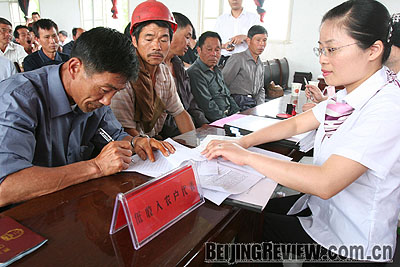|

RURAL BANKERS: The Longwan Rural Cooperative Bank, a bank set up and managed by local farmers in Zhejiang Province, has made significant contributions to the area's development
Longwan Rural Cooperative Bank, a bank of the farmers, by the farmers and for the farmers, was set up in Wenzhou City, Zhejiang Province in June 2005. It soon sparked people's interest when news came that it made a fortune of over 100 million yuan ($14.7 million) in 2007. Guangzhou Daily provided full coverage of the bank's operation. Excerpts follow.
Longwan, a bank dedicated to serving financing needs of farmers, issued about 4 billion yuan ($586 million) worth of loans last year, 60 percent of which went to rural areas. About 4,000 of its 4,639 shareholders are farmers. Last year, the bank made a net profit of 112 million yuan ($16.4 million). At present, joining stake in a rural cooperative bank has become one of the hottest investment projects in Wenzhou.
As early as 2003, Zhejiang Province was selected as one of the trial bases for establishing rural cooperative banks on the basis of rural credit cooperatives. To date, many such banks have started to provide small credit loans and joint liability loans to farmers. Longwan is one of them.
On October 19, the Central Committee of the Communist Party of China officially encouraged such financing pattern throughout the country by issuing the Decision on Major Issues Concerning the Advancement of Rural Reform and Development. It allowed small financial organizations in rural areas to get financing from large financial institutions, encouraging rural professional cooperatives to perform credit cooperation activities if condition permits. The decision reiterated the importance of establishing a modern rural financial system and stated that rural finance is the core of the modern rural economy.
Longwan's successful performance last year serves as a good example for farmers in other regions. On October 20 when Guangzhou Daily reporter visited the bank's Longshui branch, many local farmers packed its waiting room to apply for loans.
Longwan's origin
Longwan is a joint-stock local cooperative financial institution. It was set up on the basis of Longwan Credit Joint Liability Cooperative, and its subsidiaries with registered capital of 140 million yuan ($20.5 million) were invested in by 4,639 shareholders. Apart from the overwhelming number of farmers, there are 333 enterprises and 249 banking staff who are also shareholders, but have no state-owned capital.
Several other Wenzhou rural credit cooperatives, such as Lucheng, Ouhai, Leqing and Ruian, have recently converted themselves into rural cooperative banks, with many following suit of Longwan.
Li Xinhong, head of the Longshui branch of Longwan Rural Cooperative Bank, said that the bank offered its share to the public in June 2004 at the value of 1 yuan (15 cents) per share, and it issued notice to local farmers in Longwan Village to invite them to join stake.
Li said the farmers were very enthusiastic about buying stake in this new bank, and the bank raised far more money than it intended to. "We had to reduce the number of shares and distribute shares in proportion to the applicant's capital," smiled Li, adding that the rich private capital in Wenzhou spurred the development of rural cooperative banks.
Since its public offering, Longwan Rural Cooperative Bank has been running soundly. Xia Liyun, one of the bank's directors, revealed that shareholders gained 15-percent dividends for three consecutive years from 2004 to 2006. In 2007, the bank didn't distribute dividends, but bestowed the shareholders 20 percent of shares in proportion. Xia said the bank has boasted attractive shareholder return.
According to Xia, the high dividend is maintained by sound operation. At present, the bank has 16 branches and 32 offices, which are all located in Longwan region. In 2007, the bank attracted a total of 5.6 billion yuan ($821 million) of deposit, and distributed 4.02 billion yuan ($589 million) in loans, over 60 percent of which was related to agriculture. Xia expected this year's profit "will definitely far outpace that of last year."
Creditworthy farmers get good loans
The bank's profit mainly comes from small loans to farmers. Li Xinhong said there are three ranges of loans to local farmers. One is below 50,000 yuan ($7,331), which requires a mortgage or guarantee; the second is a credit loan, also below 50,000 yuan ($7,331). The third is a relatively large loan from 100,000 yuan to 300,000 yuan ($14,700 to $44,000), and the debtor must be guaranteed by four other farmers. If the debtor cannot repay the loans, the four guarantors must repay the money to the bank. "Farmers can share risks and the practice can stimulate farmers' sense of earning good credit," said Li.
Li said the top priority is to set up farmers' credit when issuing small loans. Longshui branch conducted a thorough investigation on the credit of 4,815 Longrui farmers. "If a farmer has no record of default in repayment, he/she can be cited as a credit farmer. If over 90 percent of village residents have no default in repayment, the village can be cited as a credit village," said Li.
To date, Longshui branch has assessed four credit villages and 340 credit farmers, and loans to farmers account for around 20 percent of the branch's total. The branch so far has no record of default.
Part of the rural cooperative bank's profit comes from loans to local leading enterprises. In addition, Longwan Rural Cooperative Bank also helps local private enterprises to pay salaries, and takes the function of assisting farmers to pay water and electricity fees and providing consumption and housing loans to farmers.
Li disclosed that Longshui branch has attracted over 200 million yuan ($30 million) of deposit, with nearly a half of it coming from farmers.
| 